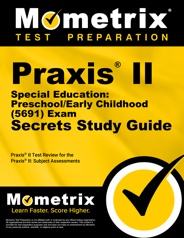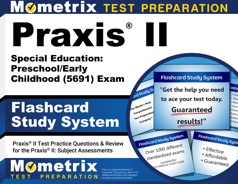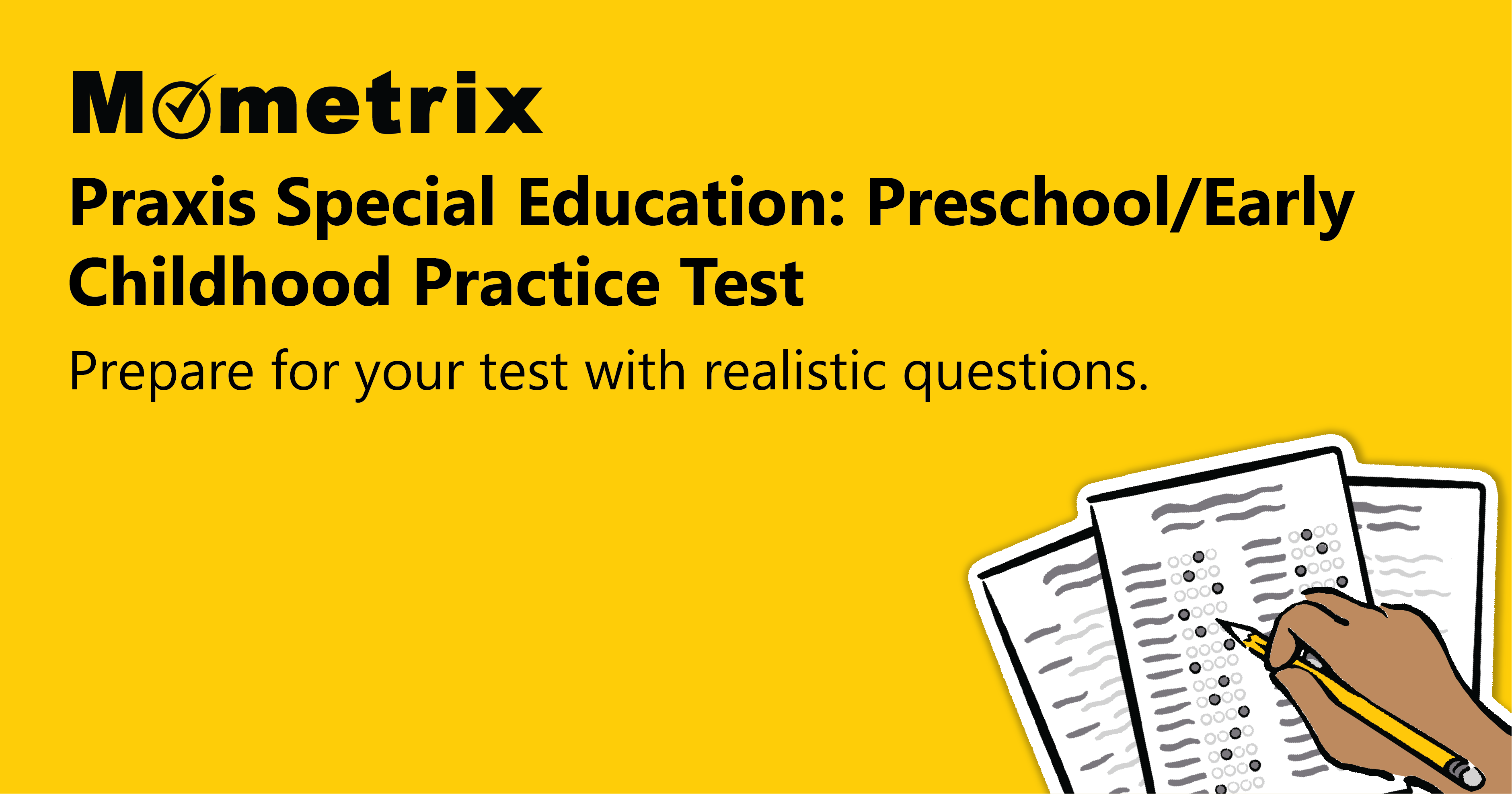The Praxis® Special Education Preschool/Early Childhood exam is designed to measure the knowledge and skills that are essential for special education teachers.
Click “Start Test” above to take a free Praxis Special Education Preschool/Early Childhood practice test, and check out our premium-quality Praxis test prep resources by clicking the links below!
Exam Outline
The Praxis Special Education Preschool/Early Childhood exam contains 130 selected-response questions, and you will be given a time limit of 2 hours.
The exam is split into four content categories, which are designed to cover the various competencies and points of knowledge that a professional educator should possess.
I. Development and Characteristics of Learners (23 questions)
The questions in this category assess your knowledge of the following:
- Cognitive development
- Language/communication development
- Physical development
- Social/emotional development
- Adaptive development
- Disabling conditions
II. IFSP, IEP Development and Delivery of Services, and Assessment and Eligibility (32 questions)
The questions in this category assess your knowledge of the following:
- Basic characteristics of each major area of exceptionality as defined in IDEA
- Federal terminology and definitions
- Federal requirements for students with disabilities under IDEA
- Federal safeguards of stakeholders’ rights
- The components of an IFSP/IEP
- The purpose, benefits, and limitations of a variety of formal and informal assessments
- Factors that can lead to misidentification of students with disabilities
- Procedures for identifying young children at risk for diabetes
- Communicating assessment results to families and other professionals
- The basic terminology used in assessments
III. Planning and Managing the Learning Environment (48 questions)
The questions in this category assess your knowledge of the following:
- The basic components of curriculum development
- Resources for locating specialized curriculum, equipment, and materials for students with disabilities
- Selecting instructional content, strategies, and resources for students with disabilities
- Using technology to support instruction
- Integrating affective, life, and social skills with academic content
- The impact of a safe, positive, and supportive learning environment
- Behavior-management strategies
- Creating an environment that promotes literacy
IV. Family, Community, and Professional, Relationships (27 questions)
The questions in this category assess your knowledge of the following:
- Strategies for planning and conducting collaborative conferences with students, their families, and school members
- Connecting families with available supportive agencies, resources, and organizations
- Strategies to involve families in their infants’ and young children’s development, progress, and learning
- Acquiring, interpreting, and applying research in the field of early childhood special education
- Ethical and legal standards associated with the field of early childhood special education
- The role of continuing professional development as a means to inform practice
Check Out Mometrix's Praxis Study Guide
Get practice questions, video tutorials, and detailed study lessons
Get Your Study Guide
Registration
To register for the Praxis Special Education Preschool/Early Childhood exam, you will need to create an online account with ETS. Through this account, you can submit an application to take the exam.
During registration, you will be asked to select the test-taking format (remote or at a testing center), test location (if you are taking the test at a testing center), and test date. You will also need to pay the $130 exam fee.
Test Day
In-person Testing
You should arrive at the testing center about 30 minutes before the scheduled testing appointment. This will give you enough time to complete the check-in process. Upon arrival, you will be asked to provide a printed copy of your admission ticket and two forms of valid identification.
You will also be asked to store all personal items in a secure locker before entering the testing area.
Once the check-in process is complete and you are fully approved for testing, you will be led to the testing station and given a brief tutorial on the testing system.
Remote Testing
To take the exam remotely, you must use a laptop or desktop computer that has the ETS Secure Test Browser downloaded and installed on it. This is the browser you must use to take the exam. You will also need a functioning webcam, speakers, and a microphone.
When you check in to take the exam, the remote proctor will ask you to show proof of identification and to move your webcam around the room so that your testing area can be observed. Once the proctor has approved your testing area, they will walk you through the testing process and begin your exam.
How the Exam is Scored
Your score is based on the number of questions you answer correctly (your raw score). Your raw score is converted to a scaled score. The scaled score you need to obtain differs slightly depending on which state you take the exam in, but most states require a score of at least 159.
You should receive an official score report about five weeks after testing.
Check Out Mometrix's Praxis Flashcards
Get complex subjects broken down into easily understandable concepts
Get Your Flashcards
FAQs
Q
How many questions are on the Praxis 5691 exam?
A
There are 130 selected-response questions on the exam.
Q
How long is the Praxis 5691 exam?
A
The time limit for the exam is 2 hours.
Q
What is the passing score for the Praxis 5691 exam?
A
To pass the exam, you must achieve a minimum scaled score of 159.
Q
How much does the Praxis 5691 exam cost?
A
The examination fee is $130.
Praxis is a registered trademark of Educational Testing Service, which is not affiliated with Mometrix Test Preparation and does not endorse this page.


